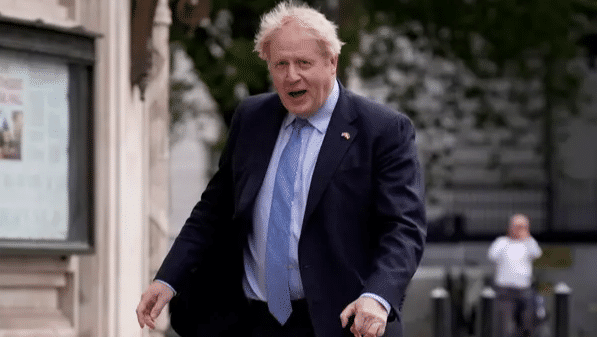Boris Johnson, the Prime Minister of the United Kingdom, resigned last week after several defections pushed the Conservative Party-led administration into a grave political crisis.
The Conservative leadership contest looks to be wide open, with contenders from practically every ideological side of the party vying for the position. There will be a variety of viewpoints for MPs and activists to consider, including one nation Tories and fiscal conservatives, Brexiters and remainers.
Also read: Five issues that led to the resignation of UK Prime Minister Boris Johnson
Here’s a breakdown of the runners, as well as what we know about their political and social views.
Rishi Sunak
Sunak‘s tax and spending policies are quite dry: like Philip Hammond and George Osborne before him, he has championed the need of keeping the public finances under control, even if it means hiking taxes in the midst of an economic crisis.
He is socially liberal, yet he has joined his campaign team with anti-woke fighter Oliver Dowden, and he supports US-style entrepreneurialism.
Liz Truss
Truss campaigned for a stay in 2016 but has since eagerly turned Brexiter, taking a strong position on the Northern Ireland protocol in recent months.
She, like many of the other candidates, is anticipated to advocate for lower taxation. She has also long been a supporter of a rightwing interpretation of individual liberty, praising a generation of “Uber-riding, Airbnb-ing, Deliveroo-eating freedom fighters.”
Also read: From Brexit deal to Partygate, a timeline of British PM Boris Johnson’s career
Sajid Javid
After retiring as chancellor in 2020, Javid painted himself as a low-tax Conservative, but as health minister, he campaigned hard for higher health and social care expenditure, and he signed up to a plan to raise national insurance payments to fund it.
He also addressed health disparities in his prior role, and he has previously emphasised the necessity of higher education colleges, having attended one himself.
Nadhim Zahawi
Perhaps unsurprisingly for an independently wealthy former businessman – the second richest MP in parliament after Sunak – the incoming chancellor has already stated that corporate taxes should be reduced.
He also hinted that more tax cuts were on the way, but Johnson’s caretaker cabinet has subsequently committed to postpone key fiscal measures until a new leader is in place.
Also read: Boris Johnson resignation: What’s next for UK economy
Tom Tugendhat
Damian Green, the chair of the Conservative MPs’ One Nation caucus, has backed the former soldier, giving him an advantage over Jeremy Hunt among softer Conservatives.
Tugendhat announced his candidacy in the Daily Telegraph, promising to “bridge the Brexit divide,” but he also asked for an urgent repeal of the recent national insurance rise, which Labour also opposed.
Jeremy Hunt
Throughout the Covid crisis, Hunt served as chair of the health and social care committee, focusing on health policy and patient safety, topics on which he just published a book.
However, when he sought leadership in 2019, his policy platform included raising the barrier for national insurance – a tax decrease for low to middle-income taxpayers – and increasing defence spending to 2.5 percent of GDP, which Boris Johnson previously endorsed. He was also less adamant about Brexit, speaking out against the no-deal scenario.
Also read: What happens after a British Prime Minister resigns from the post?
Penny Mordaunt
Mordaunt, a staunch Brexit supporter, outraged remainers during the 2016 referendum debate by falsely asserting that the UK would not have a veto over Turkey’s accession to the EU.
On economic issues, she leans to the Tory left, supporting food banks (dubbed “pantries”) in her Portsmouth North constituency and pressuring the government for further action on the cost of living crisis. She is also a strong supporter of LGBT rights.
Suella Braverman
The attorney general began her leadership campaign by promising to “get rid of all this woke rubbish,” and she has previously stated that the UK has a “rights culture” that has “spun out of control.”
She is a die-hard Brexiter who recently garnered praise from the party’s rightwing for giving the legal nod to the Northern Ireland protocol bill, despite the fact that many experts believe it violates international law.
Also read: As Boris Johnson resigns, Ukraine thanks former British PM for all his support
Kemi Badenoch
The former equalities minister, known for her eagerness to embrace controversy on culture war themes, stated that she was running because she wanted to “tell the truth.”
The MP for Saffron Walden slammed “identity politics,” writing in the Times that Johnson was “a symptom of the problems we face, not the cause of them.”
She went on to say that she supported lower taxes “to boost growth and productivity, and accompanied by a tight spending discipline.”
Grant Shapps
The transport secretary, one of the top cabinet ministers who did not resign last week, put his hat into the ring for leader on Saturday.
In an apparent dig at his colleagues, he told the publication that he had “not spent the last few turbulent years plotting or briefing against the prime minister” or quietly organising a leadership campaign.
Shapps said an emergency budget would be produced, instructing his chancellor to reduce personal tax for the most disadvantaged and provide state assistance to enterprises with high levels of energy usage, and ruled out a general election.
Also read: US, UK’s ‘special relationship’ will remain: Biden after Johnson’s resignation
Rehman Chishti
Chishti, a former lawyer, is the least well-known candidate.
He was born in Pakistan and has an interesting political history, having previously run for the opposition Labour Party in the 2005 general election. The Conservatives recruited the 43-year-old in 2007.







